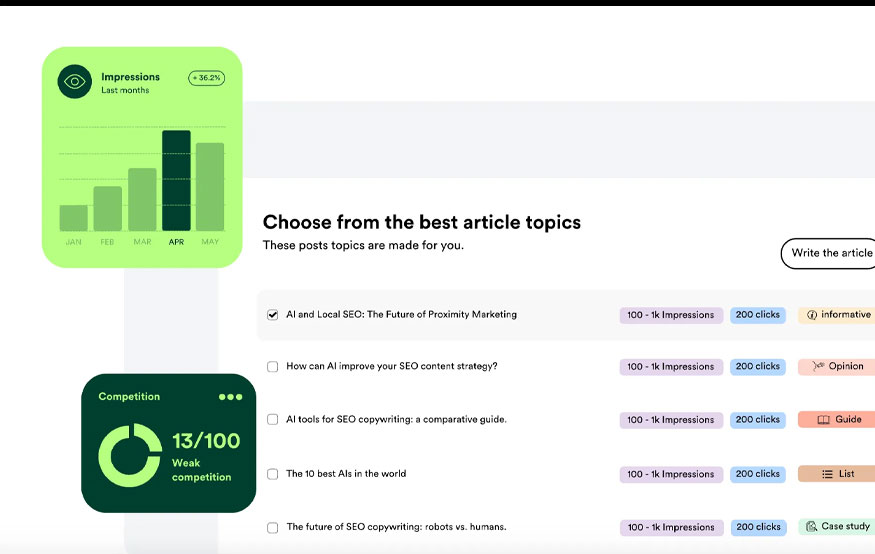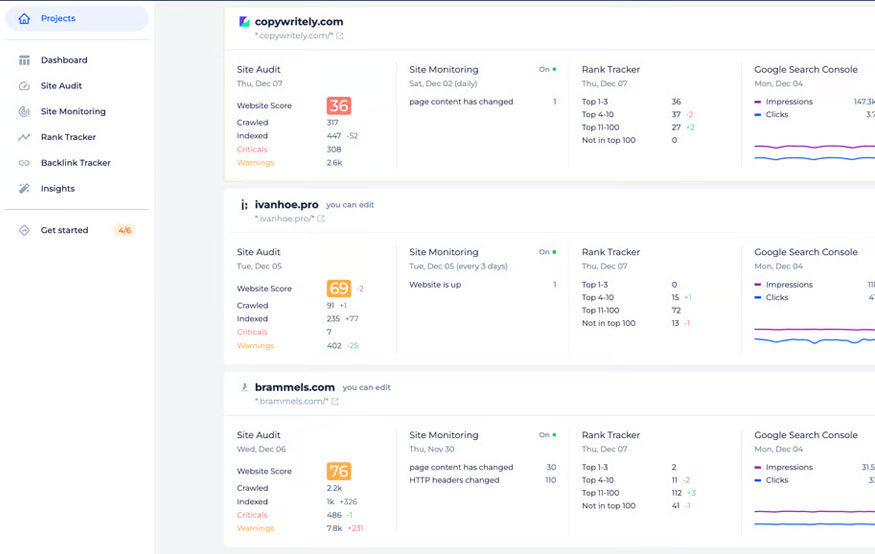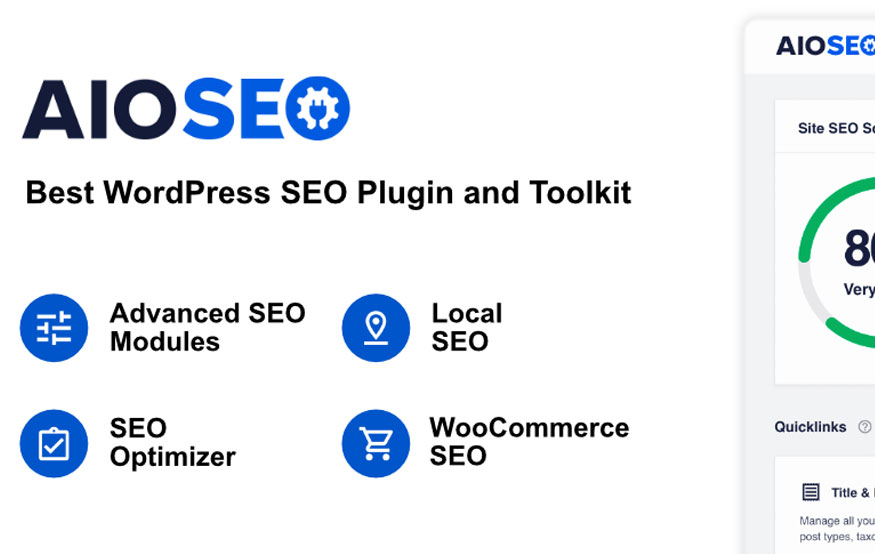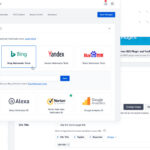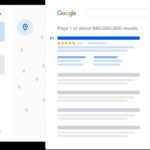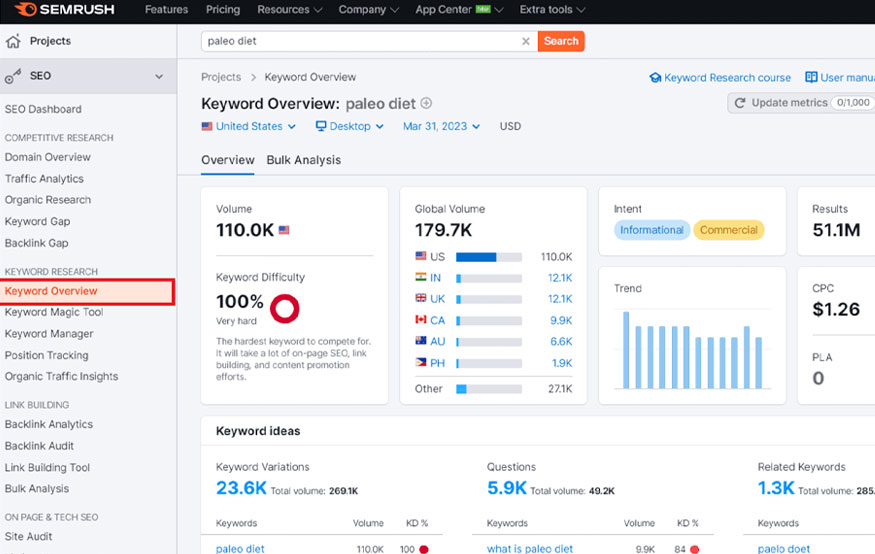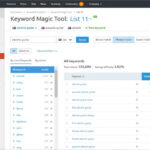Essential SEO Tools for Boosting Your Online Presence
In today’s digital landscape, having a strong online presence is crucial for businesses of all sizes.
SORT
Learn why SEO Testing Tools is free?
SEO Testing Tools is free for users because vendors pay us when they receive web traffic and sales opportunities.
SEO Testing Tools directories list all vendors—not just those that pay us—so that you can make the best-informed purchase decision possible.
73.76K reviews
339.92K followers
- 32.93K users like this
- This launch happened an unknown year
Taja leverages artificial intelligence to enhance YouTube video discoverability. This tool automatically creates search engine optimized content, including titles, descriptions, chapter markers, and hashtags for your YouTube uploads.
LICENSE MODEL
Paid
PRODUCT MODEL
Proprietary
PLATFORMS
- Online
Taja AI CATEGORIES ON SEOTESTINGTOOLS.COM
Taja AI FEATURES
- Ad-free
- Lightweight
- Privacy focused
- No Coding Required
- Copywriting
180.74K reviews
237.19K followers
- 92.37K users like this
- This launch happened 2 years ago
Blogster AI streamlines content creation with AI-driven writing, SEO optimization, and topic generation. It enhances productivity, boosts engagement, and ensures quality, making blogging effortless.
LICENSE MODEL
Freemium
PRODUCT MODEL
Proprietary
PLATFORMS
- Online
Blogster AI CATEGORIES ON SEOTESTINGTOOLS.COM
Blogster AI FEATURES
- Live Preview
- No Coding Required
- Marketing Automation
- Privacy focused
- SEO Audit
- AI-Powered
85.94K reviews
266.48K followers
- 244.45K users like this
- This launch happened 11 years ago
Sitechecker offers comprehensive SEO auditing, rank tracking, and website monitoring tools. It enhances site visibility, identifies issues, and provides actionable insights to boost search rankings effectively.
LICENSE MODEL
Freemium
PRODUCT MODEL
Proprietary
PLATFORMS
- Online
- Software as a Service (SaaS)
- Self-Hosted
- Google Chrome
Sitechecker CATEGORIES ON SEOTESTINGTOOLS.COM
Sitechecker FEATURES
- Crawler
- SEO Audit
- SEO Reports
157.65K reviews
335.11K followers
- 97.83K users like this
- This launch happened 18 years ago
AIOSEO offers automated optimization with user-friendly settings, advanced schema integration, and powerful keyword analysis, enhancing your site’s visibility and boosting organic traffic effortlessly.
LICENSE MODEL
Paid
PRODUCT MODEL
Proprietary
PLATFORMS
- Online
AIOSEO CATEGORIES ON SEOTESTINGTOOLS.COM
AIOSEO FEATURES
- Backlinks
- Social media integration
- SEO Audit
275.09K reviews
381.63K followers
- 35.96K users like this
- This launch happened 17 years ago
Semrush offers robust tools for SEO, PPC, content marketing, and social media analytics. Its competitive analysis, keyword research, and site audit features help enhance visibility and drive traffic effectively.
LICENSE MODEL
Paid
PRODUCT MODEL
Proprietary
PLATFORMS
- Online
- Software as a Service (SaaS)
Semrush CATEGORIES ON SEOTESTINGTOOLS.COM
Semrush FEATURES
- Keyword Research
- Keyword-tool
- SEO Audit
- Backlinks Analysis
- Backlink checker
- Competitive Analysis
- Website Audit
- URL analysis
Top SEO Tools apps of the week
Learn More About SEO Tools
Table of Contents
Essential SEO Tools for Boosting Your Online Presence
In today’s digital landscape, having a strong online presence is crucial for businesses of all sizes. As a tech-savvy business consultant with years of experience implementing various software systems across diverse industries, I can confidently say that Search Engine Optimization (SEO) plays a pivotal role in achieving this goal. But with the ever-evolving nature of search algorithms and the sheer complexity of SEO, it’s essential to have the right tools at your disposal. In this comprehensive guide, we’ll explore the most effective SEO tools that can help you skyrocket your website’s visibility and drive organic traffic.
Understanding the Importance of SEO Tools
Before we dive into the nitty-gritty of specific tools, let’s take a moment to appreciate why SEO tools are so crucial in the first place.
The Role of SEO in Modern Digital Marketing
SEO isn’t just a buzzword; it’s the backbone of digital marketing. Think of it as the GPS for your online business – without it, you’re essentially driving blindfolded in a labyrinth of web pages. SEO helps search engines understand what your website is about and how relevant it is to users’ queries. It’s the difference between being on the first page of Google results (hello, potential customers!) and being lost in the digital abyss of page 50.
Benefits of Utilizing SEO Tools
Now, you might be thinking, “Can’t I just wing it with SEO?” Sure, you could – if you enjoy playing darts in the dark. SEO tools are like night-vision goggles for your digital strategy. They provide:
- Data-driven insights into your website’s performance
- Competitive analysis to see where you stand in the market
- Actionable recommendations for improvement
- Automated tracking of hundreds of SEO metrics
In essence, SEO tools turn the complex world of search engine algorithms into digestible, actionable information. They’re the Swiss Army knives of digital marketing – versatile, essential, and incredibly handy when you’re in a pinch.
Top SEO Tools for Keyword Research
Keyword research is the foundation of any solid SEO strategy. It’s like choosing the right ingredients before cooking a gourmet meal – get it wrong, and the whole dish falls flat.
Google Keyword Planner
Let’s start with the granddaddy of keyword research tools: Google Keyword Planner. It’s free, it’s powerful, and it comes straight from the horse’s mouth (Google being the horse in this slightly strange analogy).
Key Features:
– Search volume data
– Keyword ideas and suggestions
– Competition level insights
– Historical trends
Pro Tip: While Keyword Planner is primarily designed for Google Ads, savvy SEO professionals can leverage its data for organic search strategies too.
SEMrush
If Google Keyword Planner is a Swiss Army knife, SEMrush is the entire toolbox. This comprehensive platform offers a suite of SEO tools, with its keyword research capabilities being particularly impressive.
Standout Features:
– Keyword difficulty scores
– SERP feature analysis
– Long-tail keyword suggestions
– Competitor keyword analysis
SEMrush isn’t just about finding keywords; it’s about understanding the entire competitive landscape around those keywords. It’s like having a spy satellite for your SEO strategy.
Ahrefs Keywords Explorer
Ahrefs is another heavyweight in the SEO tools arena, and its Keywords Explorer tool is a force to be reckoned with. It’s particularly adept at helping you uncover low-hanging fruit – those golden keywords with high search volume but low competition.
What Sets It Apart:
– Clickstream data for more accurate search volumes
– “Keywords also rank for” feature
– Parent topic analysis
– Return rate and clicks per search metrics
On-Page SEO Optimization Tools
Once you’ve nailed your keyword strategy, it’s time to optimize your actual web pages. This is where on-page SEO tools come into play.
Yoast SEO
If you’re running a WordPress site (and let’s face it, who isn’t these days?), Yoast SEO is like having a mini SEO consultant right in your dashboard.
Key Features:
– Real-time page analysis
– Readability checks
– XML sitemap functionality
– Title and meta description templating
Yoast SEO doesn’t just tell you what to do; it shows you how to do it. It’s like having training wheels for your SEO bicycle – incredibly helpful when you’re starting out, but you’ll still need to pedal (i.e., create great content) yourself.
Screaming Frog SEO Spider
Don’t let the name scare you – Screaming Frog is more like a helpful spider that crawls your website to find SEO issues. It’s particularly useful for larger websites where manually checking each page would be about as fun as watching paint dry.
What It Does Best:
– Identifies broken links
– Analyzes page titles and meta data
– Discovers duplicate content
– Generates XML sitemaps
Think of Screaming Frog as your website’s health check-up. It might not be the most exciting tool, but it’s absolutely essential for maintaining a robust online presence.
Backlink Analysis and Link Building Tools
Backlinks are the currency of the internet. They’re like votes of confidence from other websites, telling search engines, “Hey, this content is worth checking out!”
Moz Link Explorer
Moz has been a stalwart in the SEO community for years, and their Link Explorer tool is a testament to why. It provides a comprehensive view of your website’s link profile and helps you identify opportunities for improvement.
Standout Features:
– Domain Authority and Page Authority metrics
– Spam Score for identifying toxic links
– Link intersect tool for competitive analysis
– Historical link data
Moz Link Explorer is like having X-ray vision for your backlink profile. It helps you see not just where your links are coming from, but also the quality and relevance of those links.
Majestic
Majestic takes a slightly different approach to link analysis, focusing on the concept of “topical trust flow.” This metric helps you understand not just the quantity of your backlinks, but their relevance to your niche.
What Makes It Unique:
– Trust Flow and Citation Flow metrics
– Topical Trust Flow categories
– Historical Index dating back to 2006
– Clique Hunter for finding link opportunities
Majestic is particularly useful for those deep-dive link analyses where you really want to understand the nuances of your link profile. It’s like having a microscope for your backlinks – incredibly detailed and precise.
SEO Reporting and Analytics Tools
All the optimization in the world doesn’t mean much if you can’t measure your results. That’s where SEO reporting and analytics tools come in.
Google Analytics
Google Analytics is the gold standard for website analytics, and for good reason. It provides a wealth of data about your website’s performance, user behavior, and traffic sources.
Key Features:
– Real-time traffic data
– Audience demographics and interests
– Conversion tracking
– Custom report creation
While not strictly an SEO tool, Google Analytics is essential for understanding how your SEO efforts are impacting your overall website performance. It’s like having a dashboard for your entire online presence.
Google Search Console
If Google Analytics is your website’s dashboard, Google Search Console is your direct line to Google itself. It provides invaluable insights into how Google sees your website and how users are finding you in search results.
What It Offers:
– Search performance data
– Index coverage report
– Mobile usability insights
– Rich result status
Google Search Console is like having a backstage pass to Google’s search engine. It gives you direct feedback on your SEO efforts and can help you identify issues before they become major problems.
Emerging Trends in SEO Tools
The world of SEO is constantly evolving, and so are the tools we use to navigate it. Let’s take a quick look at some emerging trends in SEO tools.
AI-Powered SEO Assistants
Artificial Intelligence is making its way into every aspect of digital marketing, and SEO is no exception. AI-powered SEO tools can provide more accurate predictions, automate routine tasks, and even generate content ideas.
Examples to Watch:
– MarketMuse for AI-driven content optimization
– Frase.io for AI-powered content creation
– Clearscope for AI-assisted keyword optimization
These tools are like having a team of SEO experts working 24/7 to optimize your content. They’re not quite at the level of replacing human expertise, but they’re getting closer every day.
Voice Search Optimization Tools
With the rise of smart speakers and voice assistants, optimizing for voice search is becoming increasingly important. Tools that help you understand and optimize for natural language queries are on the rise.
Emerging Players:
– Answerthepublic for question-based keyword research
– BrightLocal’s Voice Search Readiness Report
– Schema App for structured data optimization
Voice search optimization tools are still in their infancy, but they’re likely to become increasingly important as voice-based internet use continues to grow.
Conclusion
The world of SEO tools is vast and ever-changing, but having the right tools in your arsenal can make all the difference in your online success. From keyword research to on-page optimization, from link building to analytics, there’s a tool out there for every aspect of SEO.
Remember, though, that tools are just that – tools. They’re incredibly powerful when wielded correctly, but they’re no substitute for a solid understanding of SEO principles and a commitment to creating valuable, user-focused content.
As you navigate the complex world of SEO, keep experimenting with different tools to find the combination that works best for your specific needs. And always keep an eye on emerging trends – in the fast-paced world of digital marketing, today’s cutting-edge tool could be tomorrow’s industry standard.
FAQs
-
Q: How often should I be using these SEO tools?
A: The frequency depends on your specific needs, but generally, you should be using keyword research tools at the start of any new content initiative, on-page optimization tools for every piece of content you publish, and analytics tools on a weekly or monthly basis to track progress. -
Q: Are free SEO tools as effective as paid ones?
A: Free tools can be very effective, especially for small businesses or those just starting out. However, paid tools often offer more comprehensive features and data. It’s often best to start with free tools and upgrade to paid versions as your needs grow. -
Q: Can SEO tools guarantee a top ranking on Google?
A: No tool can guarantee top rankings, as search engine algorithms are complex and ever-changing. SEO tools provide insights and recommendations, but success still depends on how you implement these insights and the overall quality of your content. -
Q: How do I choose the right SEO tools for my business?
A: Start by identifying your specific needs and goals. Consider factors like your budget, the size of your website, your technical expertise, and the specific features each tool offers. Many tools offer free trials, so take advantage of these to test different options before committing. -
Q: Are these tools suitable for local SEO as well?
A: Many of these tools have features that can help with local SEO, such as local keyword research and location-based analytics. However, for businesses focusing heavily on local SEO, it might be worth looking into specialized local SEO tools in addition to these more general-purpose options.






